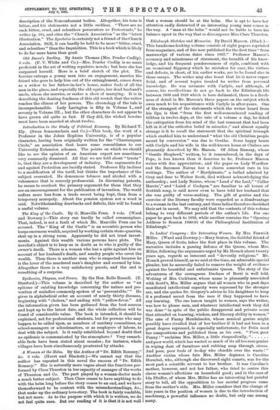In Ladies' Company : Six Interesting Women. By Mrs. Fenwick
Miller. (Ward and Downey.)—Mary Seaton, the faithful friend of Mary, Queen of Scots, takes the first place in this volume. The narrative includes a passing defence of the Queen, whom Mrs. Miller, following the arguments urged by Mr. Hosack about twenty years ago, regards as innocent and "devoutly religious." Mr. Hosack proved himself, as we said at the time, an admirable special pleader, but he assuredly failed to remove the weight of evidence against the beautiful and unfortunate Queen. The story of the adventures of the courageous Duchess of Bern is well told. Writing of Mrs. Cockburn, whose name is pleasantly associated with Scott's, Mrs. Miller argues that all women who in past days manifested intellectual capacity were repressed by the stronger sex, and she quotes Dr. Gregory's advice to his daughters to keep it a profound secret from the men if they happened to have any learning. The one lesson taught to women, says the writer, was how to please men, and whatever intellectual work they did was done "in spite of the public disapproval and private scorn that attended on learning, wisdom, and literary ability in women." The case of Fanny Mendelssohn, whose musical genius might possibly have rivalled that of her brother if it had not been in a great degree repressed, is especially unfortunate, for Felix used her compositions and published them as his own. "Poor, poor
Fanny ! " exclaims Mrs. Miller, a little rhapsodically," and poor world, which has wasted so much of its all too rare genius in wiping dust off furniture and rubbing soap through sieves. And poor, poor fools of to-day who chuckle over the waste ! " Another victim whose fate Mrs. Miller deplores is Caroline Herschel, who, although she discovered eight comets, was for the most part a scientific servant to her brother. It was Caroline's mother, however, and not her father, who tried to centre this clever woman's affections on household good ; and in the case of Ida Pfeiffer, of whom Mrs. Miller has an interesting but painful story to tell, all the oppositition to her mental progress came from the mother's side. Mrs. Miller considers that the change of late years in the position of women is due to the introduction of machinery, a powerful influence no doubt, but only one among many.


















































 Previous page
Previous page